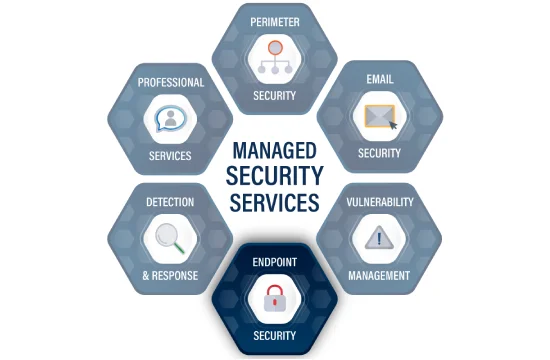What are Managed Security Services (MSS)?
Managed Security Services (MSS) are a comprehensive suite of outsourced cybersecurity solutions designed to protect organizations from evolving cyber threats. These services are provided by Managed Security Service Providers (MSSPs),who offer continuous monitoring, threat detection, and incident response to ensure businesses remain secure against cyberattacks. MSS is an essential component of modern cybersecurity strategies, allowing organizations to leverage expert knowledge, advanced security tools, and proactive threat management without the burden of maintaining an in-house security team.
At its core, Managed Security Services provide round-the-clock security monitoring and management of an organization’s IT infrastructure. This includes firewalls, intrusion detection and prevention systems (IDPS),endpoint security solutions, vulnerability assessments, and compliance management. MSSPs use advanced security technologies, such as artificial intelligence, machine learning, and automation, to identify and respond to potential threats in real time. By continuously analyzing network traffic and system behavior, MSSPs can detect anomalies that may indicate a cyberattack, allowing them to mitigate risks before they escalate.
One of the primary benefits of MSS is its ability to provide businesses with a proactive security posture. Traditional, reactive cybersecurity approaches often leave organizations vulnerable to sophisticated attacks. MSSPs, however, use proactive threat intelligence, behavioral analysis, and predictive analytics to anticipate and prevent security incidents before they cause significant damage. This approach is particularly valuable in industries that handle sensitive data, such as finance, healthcare, and government, where compliance with stringent security regulations is mandatory.
Managed Security Services also help organizations reduce costs associated with cybersecurity. Maintaining an in-house security team requires significant investment in personnel, training, and security tools. By outsourcing to an MSSP, businesses can access a team of cybersecurity experts at a fraction of the cost. Additionally, MSSPs provide scalable security solutions, allowing businesses to adjust their security needs based on growth, regulatory changes, or evolving threats.
Another key advantage of MSS is its ability to enhance incident response and recovery. When a security breach occurs, MSSPs have established protocols to contain and remediate the threat quickly. This minimizes downtime, reduces financial losses, and helps businesses recover faster. MSSPs also provide detailed reports and forensic analysis, helping organizations understand the root cause of an attack and improve their security defenses.
As cyber threats become more sophisticated, businesses of all sizes are turning to Managed Security Services to strengthen their security posture. Whether it’s protecting against ransomware, phishing attacks, insider threats, or compliance violations, MSS offers a robust, proactive, and cost-effective solution for modern cybersecurity challenges.
Key Components of Managed Security Services
Managed Security Services (MSS) consist of several key components that work together to provide comprehensive cybersecurity protection. These components are designed to proactively monitor, detect, and respond to security threats, ensuring that an organization’s IT environment remains secure. By outsourcing security operations to a Managed Security Service Provider (MSSP),businesses can leverage advanced technologies and expert-driven strategies without the need for an in-house security team. Below are the essential components of Managed Security Services that help organizations maintain a strong security posture.
One of the primary components of MSS is 24/7 Security Monitoring and Threat Detection. MSSPs provide continuous monitoring of networks, endpoints, cloud environments, and applications to identify suspicious activity and potential threats. Using advanced security analytics, machine learning, and artificial intelligence, MSSPs detect anomalies that may indicate cyberattacks, unauthorized access, or insider threats. This real-time monitoring ensures that organizations receive immediate alerts and responses to security incidents before they cause significant damage.
Intrusion Detection and Prevention Systems (IDPS) play a critical role in MSS by actively scanning network traffic for malicious activity. These systems analyze incoming and outgoing data to detect potential intrusions and automatically take action to block or mitigate threats. By leveraging threat intelligence feeds and behavioral analytics, MSSPs can identify new and emerging cyber threats, helping businesses stay ahead of attackers.
Another key component of MSS is Endpoint Security and Device Management. With the increasing number of remote and mobile devices connecting to corporate networks, securing endpoints is more important than ever. MSSPs deploy endpoint protection solutions, such as antivirus software, endpoint detection and response (EDR) tools, and mobile device management (MDM) systems to prevent malware infections and unauthorized access. By enforcing strict security policies and ensuring timely patching of vulnerabilities, MSSPs help organizations reduce the risk of endpoint-based attacks.
Firewall and Network Security Management is another essential aspect of MSS. Firewalls act as the first line of defense against external threats by filtering traffic based on predefined security rules. MSSPs manage and optimize firewall configurations, ensuring that security policies align with an organization’s risk tolerance. They also conduct regular security audits to identify and address potential weaknesses in network defenses.
Vulnerability Management and Patch Management are critical for preventing cyber threats. MSSPs perform regular vulnerability assessments to identify security gaps in an organization’s systems, applications, and networks. By continuously scanning for weaknesses and ensuring that patches and security updates are applied promptly, MSSPs help organizations stay protected against exploits and zero-day attacks.
Incident response and remediation are vital components of MSS. Incident Detection and Response (IDR) services ensure that when a security breach occurs, MSSPs take immediate action to contain the threat, investigate the root cause, and implement remediation measures. This reduces downtime and minimizes the impact of security incidents on business operations. MSSPs also provide post-incident analysis and forensic investigations to help organizations strengthen their defenses against future attacks.
Compliance and Risk Management services help organizations meet industry-specific regulatory requirements, such as GDPR, HIPAA, PCI-DSS, and ISO 27001. MSSPs assist businesses in maintaining compliance by implementing security controls, conducting audits, and generating compliance reports. This is particularly valuable for organizations operating in highly regulated industries, where failing to meet security standards can result in legal and financial consequences.
Security Information and Event Management (SIEM) and Threat Intelligence enhance an organization’s ability to detect and respond to cyber threats. SIEM solutions collect and analyze security event data from multiple sources to identify patterns and correlations that indicate potential attacks. MSSPs leverage SIEM platforms and global threat intelligence to provide organizations with real-time insights into emerging cyber threats, helping them take proactive measures to mitigate risks.
Finally, Cloud Security and Identity & Access Management (IAM) are essential components of MSS in today’s cloud-driven environments. MSSPs implement cloud security solutions to protect data, applications, and workloads hosted in cloud platforms like AWS, Azure, and Google Cloud. Additionally, IAM solutions ensure that only authorized users have access to critical systems, reducing the risk of unauthorized access and insider threats.
By integrating these key components, Managed Security Services provide businesses with a comprehensive cybersecurity framework that proactively defends against cyber threats. Whether through continuous monitoring, advanced threat detection, incident response, or compliance management, MSS helps organizations maintain a strong security posture while reducing the complexity and cost of managing cybersecurity in-house.
Benefits of Using Managed Security Services
Managed Security Services (MSS) offer a range of benefits that help organizations enhance their cybersecurity posture while reducing costs and operational complexity. As cyber threats become more advanced, businesses must take a proactive approach to security to protect sensitive data, maintain compliance, and ensure business continuity. By outsourcing security operations to a Managed Security Service Provider (MSSP),organizations gain access to expert-driven security solutions without the burden of managing an in-house cybersecurity team. Below are the key benefits of using Managed Security Services.
One of the primary advantages of MSS is 24/7 Security Monitoring and Threat Detection. Cyberattacks can happen at any time, and businesses need round-the-clock security monitoring to detect and respond to threats in real time. MSSPs use advanced technologies, such as artificial intelligence (AI),machine learning, and behavioral analytics, to identify suspicious activities and prevent security breaches. This proactive approach ensures that threats are detected and neutralized before they can cause damage.
Cost Savings and Reduced Operational Overhead are significant benefits of using MSS. Building an in-house cybersecurity team requires substantial investments in hiring, training, and purchasing security tools. Additionally, maintaining a security operations center (SOC) can be expensive for businesses with limited resources. By outsourcing security to an MSSP, organizations can access enterprise-grade security solutions at a fraction of the cost, allowing them to allocate resources more effectively.
Another major benefit of MSS is Access to Cybersecurity Expertise and Advanced Technologies. Cyber threats are constantly evolving, and keeping up with the latest attack vectors, vulnerabilities, and defense mechanisms requires specialized knowledge. MSSPs employ cybersecurity experts who continuously monitor industry trends and leverage cutting-edge security technologies to protect businesses. This level of expertise ensures that organizations remain ahead of cybercriminals without having to invest in ongoing security training.
Faster Threat Detection and Incident Response is critical for minimizing the impact of cyberattacks. MSSPs use advanced threat intelligence and Security Information and Event Management (SIEM) solutions to detect anomalies and respond to incidents quickly. In the event of a security breach, MSSPs follow predefined incident response protocols to contain the threat, investigate its origin, and implement remediation measures. This reduces downtime, prevents data loss, and minimizes financial and reputational damage.
Improved Compliance and Risk Management is another key advantage of MSS. Many industries, including healthcare, finance, and government, are subject to strict regulatory requirements such as GDPR, HIPAA, PCI-DSS, and ISO 27001. MSSPs help businesses meet these compliance standards by implementing security controls, conducting regular audits, and generating compliance reports. By ensuring regulatory adherence, organizations can avoid hefty fines and legal consequences while maintaining trust with customers and stakeholders.
Scalability and Flexibility make Managed Security Services an attractive option for businesses of all sizes. Whether a company is a small startup or a large enterprise, MSSPs offer customizable security solutions that can scale according to business needs. Organizations can easily adjust their security coverage as they expand, adopt new technologies, or face emerging threats. This flexibility allows businesses to maintain a strong security posture without having to constantly overhaul their cybersecurity infrastructure.
Another important benefit is Proactive Threat Intelligence and Risk Prevention. MSSPs collect and analyze threat intelligence from global sources, enabling businesses to anticipate and mitigate cyber threats before they materialize. By leveraging predictive analytics and behavioral monitoring, MSSPs can identify potential security risks and implement preemptive measures to strengthen defenses. This proactive approach is crucial in an era where cybercriminals use sophisticated tactics to bypass traditional security measures.
Enhanced Cloud Security and Data Protection are essential as businesses increasingly rely on cloud-based services and remote workforces. MSSPs provide cloud security solutions that protect data, applications, and workloads in environments such as AWS, Azure, and Google Cloud. Additionally, they implement Identity and Access Management (IAM) solutions to ensure that only authorized users can access sensitive information. This reduces the risk of insider threats, credential theft, and unauthorized data access.
Lastly, Business Continuity and Disaster Recovery are major benefits of using MSS. Cyberattacks, such as ransomware and Distributed Denial-of-Service (DDoS) attacks, can disrupt operations and lead to significant financial losses. MSSPs provide disaster recovery solutions that ensure quick restoration of systems and data after an attack. By having a well-defined incident response and recovery plan, businesses can minimize downtime and maintain operational resilience even in the face of cyber threats.
In summary, Managed Security Services provide businesses with a cost-effective, scalable, and expert-driven approach to cybersecurity. From continuous monitoring and rapid incident response to compliance management and proactive threat intelligence, MSSPs help organizations strengthen their defenses while reducing the complexities of in-house security management. As cyber threats continue to evolve, adopting MSS is a strategic decision that ensures long-term protection and business continuity.






